11 Strategies to Protect Your Intellectual Property in Online Courses
Note from the editor: This article is solely for informational use. Please consult a qualified legal professional prior to relying only on the information provided below.
Content. Content is the heart of any educational and information-based company. It shows the world the expertise of your company, lends your business a voice, and helps generate your business revenue. Naturally, it deserves protection.
However, how can you handle protecting your intellectual property (IP), especially given the reality of the sharing economy on the internet'? When even Hollywood with its top-of-the-line lawyers, cannot control illicit downloads or file sharing, as well as piracy, how can you keep your IP protected as a course and content creator?
The real-world implications of the internet:
Even with all of today's technological advances, we can't fully protect our IP. When it is online, it's at risk being stolen, copied or used by someone that haven't paid. It's true. If someone really wants to get their hands on it, they'll.
If you find that your IP is being used for illegitimacy in threatening method, then you have to take action in the situation. When somebody uses your own identity, content, IP, or even name to gain money of your business, you must call an expert in law enforcement immediately.
Although responding appropriately to your IP stolen great and well, setting safeguards is far better.
1. Get a Trademark
If you are really concerned with the security of your IP It might be worth considering a Trademark. This isn't a good option for all business, and it's expensive too. But, I'd recommend talking to the Trademark Attorney and asking their advice regarding what the options you have could be.
2. Print & mail your content to yourself
Print your entire course, including the lessons plans, curriculum and other content. Then, mail your copy to yourself with tracking and recorded delivery, then don't ever ever look at the file. If anyone ever reproduced your content and it went to court to resolve the issue then you've got the latest evidence of when your material was written and the amount of time it's been in existence for. Simple, yet effective.
3. Time stamp your content
If you are sharing online content, don't forget that if you are sharing publicly, that is your proof that you published it first! Every blog post includes the date "published" in it. Each YouTube video, status updates, and live stream videos display the date of publication as well. If an identical article is published within a few days of the original post the obvious question is who was the source.
4. Make sure you show your face
5. Watermark your content
Check that your company's name as well as your website's URL, or watermark are displayed on your instructional videos and documents. That way, if your material has been used illegally yet it has your logo, face and website on your content, it's you who receives the praise as well as the credit, fan and the subsequent revenue that could result from someone who has watched the content.
Here's an example the watermark that I've added to one of my YouTube videos:

6. Make it common knowledge
If you own a'saying', an approach an approach, a method or anything you consider personal, don't think about what you could do to wrap the thing up and secure it. Instead, find ways to make it so big and personal to you, regardless of where or how it is used, everybody knows that it is yours. Use it on every video, every blog, on your website and in your signature email and in every interview you conduct and anywhere else you're in the public eye. Make it undeniably yours, but allow it to be a part of anyone who would like to identify themselves as part of it - after all, that's how you build a tribe.
This is precisely how and why I created ' Edupreneurs' and defined the term ' Edupreneurship'. I wanted to be an unquestionably leader in something, yet do it in a manner that was able to give away something that other people to claim as their own - an identity that is theirs, but that ultimately is always going to me as the one responsible for creating it.
7. Watch out for duplicates of your material
Just keep an eye for your belongings. I use Google Alerts which is a completely free Google tool that allows you to input various search terms, such as your name and certain words and phrases that you frequently use. After you have set it up, Google will email you when those phrases or words are published online - then you can check them out to determine if they've copied or referenced correctly, or if it's simply a random coincidence.

You can also employ plagiarism checking software to determine whether your writing has been copied from anywhere. There are lots out there However, one is Copyscape which allows you can insert the URL to your blog post for example It will scan the web for matching material.
8. Have a Copyright Policy
You are able to develop your own rules to guide and educate the public about what is allowed and what's not acceptable when it comes with your IP. While this doesn't guarantee protection for you from legal liability, this education could help people who want to use your name in reference to them, and in the right way. Write down a clear list of what you consider acceptable when it comes to referencing you and your work and sharing or copying it. Also, write down what's not. Provide them with guidelines regarding the sorts of things they would need to ask your permission to do and the things they are able to use without asking to be granted written permission.
Consider adding the copyright symbol ((c)) or disclaimer on your content. Even though it's not providing any additional security, it could make others take a second look before reproducing it.
9. Create a course that is truly useful for only one person
10. If you hold it back and don't let it go, you're the culprit.
It can be easy to slip into defensive mode, to safeguard our intellectual property and put it inside a secret knowledge cave in a safe place from people who pinch'. However, don't hide all your knowledge to prevent your millions of potential clients from learning it, just so that a small handful of customers don't understand the information. There's a certain amount of madness within this.
We can become so obsessed in defending ourselves that we don't think about the people that we're trying aid by creating courses in the first place in the end, stealing the chance to educate them. What's more troubling? thousands of people who have their lives changed by your content with a few people getting their hands on it "on the market' or nobody ever getting your assistance at all?
11. Keep in mind that nobody will ever be the same as you.
The most wonderful thing about being human is that each of us is unique. We can all copy our words, our writing, our thoughts and even our ideas however they cannot be us.
People don't buy stuff, they buy people. Because people like people. How we talk our words, how we dress, the tone of our voice, how we carry our bodies, what we don't or don't think of reminding them of, how we make them feel in our non-verbal communications and more of the subconscious subtleties which are the real reason behind every purchase we make are all aspects that will never ever be taken from us no matter the effort of someone trying.
I am very aware of the fact the regardless of my increasing competition every day and the amount of competitors who are looking to take over my audience with their own material, they'll never ever be me, which implies they will never pose an issue.
You are the biggest mark of your IP so although we need to keep half an eye open, don't let the fear of having your IP duplicated be the reason for you changing people's lives.
Sarah Cordiner is an education expert, author, lecturer instructor, and award-winning online course creator , and chief executive officer of Main Training. She has been in business for 11 years in the field of education and more than 5,000 students across 121 countries - Sarah captures the enchanting combination of entrepreneurship and education as the EDUpreneur's internationally acclaimed leader in the field of 'profitably teaching your market'.
